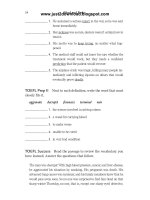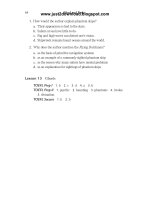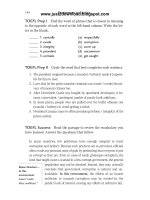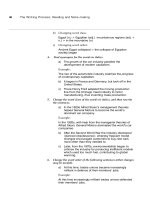Tài liệu Academic Writing A Handbook for International Students part 8 pdf
Bạn đang xem bản rút gọn của tài liệu. Xem và tải ngay bản đầy đủ của tài liệu tại đây (183.1 KB, 10 trang )
1.16 Rewriting and Proof-reading
When you have finished the conclusion it may be tempting to hand
in your work immediately. However, it is almost certain that it can
be improved by being revised. With longer assignments, it may be
worth asking a classmate to read your work and make criticisms.
Proof-reading is a vital final step, which can prevent confusion or
misunderstanding due to simple errors. Computer programs that
check spelling will not detect other common types of mistakes.
Rewriting
1. After finishing the first draft of an essay you should, if you
have time, wait for a while and then re-read it, asking the
following questions.
a) How well does this answer the question in the title?
b) Have I forgotten any points which would strengthen the
development?
c) Is it clearly structured and well linked together?
2.
Read this short essay written by a Japanese student on the title
‘Compare the university system in your country with the British
system’. Answer the questions above as you read.
It is said that there are large differences in the teaching
methods between British universities and Japanese ones.
Courses in British universities consist mainly of lectures,
discussions, presentations and tutorials and students
study specifically their major subject. On the other hand,
Japanese universities normally only have lectures in the
first two years and students have to study a wide range of
subjects in addition to their major. The aim of this essay is
to compare and analyse each system.
In British universities, students need a more active attitude
in their study than Japanese students. They need to
prepare for presentations and discussions. This is useful
for learning because they take much time for study
outside the classroom and as they become familiar with
their subjects they will become more interested in them.
In Japan, students’ attitude is amazingly passive and they
study only just before exams.
The other difference between British universities and
Japanese ones is, as mentioned above, British students
concentrate on their major subject and gain specific
knowledge about it. Japanese students, however, gain
wider knowledge by studying a few other subjects
in addition to their major. This system gives students
apparently much knowledge but they cannot study their
major deeply and their knowledge is wide-ranging but not
useful.
cross-reference
2.4 Comparison
4.5 Comparison Essay
1.16 Rewriting and Proof-reading
61
In conclusion, British teaching methods give students
more chance to know the subject thoroughly compared to
Japanese teaching methods, but Japanese methods are
suitable for students who are eager to gain a wide range
of knowledge and like to study on their own. It is hard to
say which is better, it depends on students.
3. A careful re-reading of the essay would suggest the following
points.
a) The essay only partly answers the title. It looks at
university life from a student’s position, but does not
really deal with the ‘system’ as a whole. The last line of the
conclusion discusses a question not asked in the title.
b) To deal with the subject more fully the writer needs to
examine topics such as length of courses, funding of
students and admission procedures. If there is not space to
discuss these in detail they must be at least mentioned, to
show that the writer is aware that they are central to the
subject.
c) The introduction needs to be more general. It goes straight
to a comparison of teaching methods. This could be in
the main body. Otherwise the essay is well organised and
quite logical.
62
The Writing Process: Writing Stages
4. Use the notes below to rewrite the introductory paragraph. (NB
It is not necessary to include more details than are given below.)
university education important in both UK and Japan
(over 30% 18-year-olds)
main points for comparison
a) admissions
b) length of courses: first and higher degrees
c) teaching methods
d) assessment
e) financial support
essay will examine each point and analyse differences
between countries
In both Britain and Japan, university education is undertaken by
a significant number (more than 30%) of all young people after
leaving school.
cross-reference
1.14 Introductions
1.16 Rewriting and Proof-reading
63
Proof-reading
5. Before handing in any piece of written work for marking, it
is important to check it carefully for errors which may distort
your meaning or make your work difficult to understand.
The following examples each contain one common type of error.
Underline the error and match it to the list of error types in the
box.
i) factual v) vocabulary ix) missing word
ii) word ending vi) spelling x) unnecessary
word
iii) punctuation vii) singular/
plural
iv) tense viii) style
a) The natural poorness of Japan has been overcome
...
b) In 1980 in the United States there is 140,000 people
who . . .
c) Actually, hardly any of these has succeeded . . .
d) . . . to choose the most suitable area in which they
can success.
e) Chinese history reflects in real social and cultural
changes.
f) The highest rate of imprisonment was regestred in the
USA . . .
g) Malaria is on the increase in countries such as Africa
...
h) I am very interested in German economy . . .
i) . . . the french system is quite different.
j) You don’t always know which method is best.
6. When proof-reading it is a good idea to exchange texts with
another student, since you may become overfamiliar with
your own work. However, even in exam conditions, when this
is not possible, it is vital to spend a few minutes checking
through your work as this may reveal careless errors that can
be quickly corrected.
Underline and correct the errors in the extracts below (one or
two in each).
a) The graph shows changes in the number of prisoners
over 5 years (1930–80).
cross-reference
2.13 Style
3.9 Nouns and Adjectives
3.14 Punctuation
3.16 Singular or Plural?
3.23 Verbs – Tenses
64
The Writing Process: Writing Stages
b) . . . the way the government prepares his citizens to
contribute in the development . . .
c) Secondly, education not only teach people many
knowledge . . .
d) However, weather it is the most important factor is the
issue . . .
e) There has been a sharp decrease between 1930 and
1950.
f) The quality of a society depends in the education
level.
g) America had the biggest figure for crime . . .
7. Proof-reading a longer text is more difficult. The following is
an extract from an essay comparing university education in
Taiwan and the UK.
Correct any errors you find.
There are many similaries to the UK and Taiwan, for
example course fees, assessment and so on. Firstly, both
UK universities and Taiwan universities charge fees from
students, but course fees in the UK is as expensive as that
in Taiwan. In addition, teaching methods are very similar
to both of countries. Students should attend lectures and
seminars. Moreover, they have the same system to assess
students, which are examed at the end of semester.
Nevertheless, there are three main differences: how
students can entry a university and how much percentage
of students are in higher education. Students in higher
education in Taiwan are twice more than in the UK









